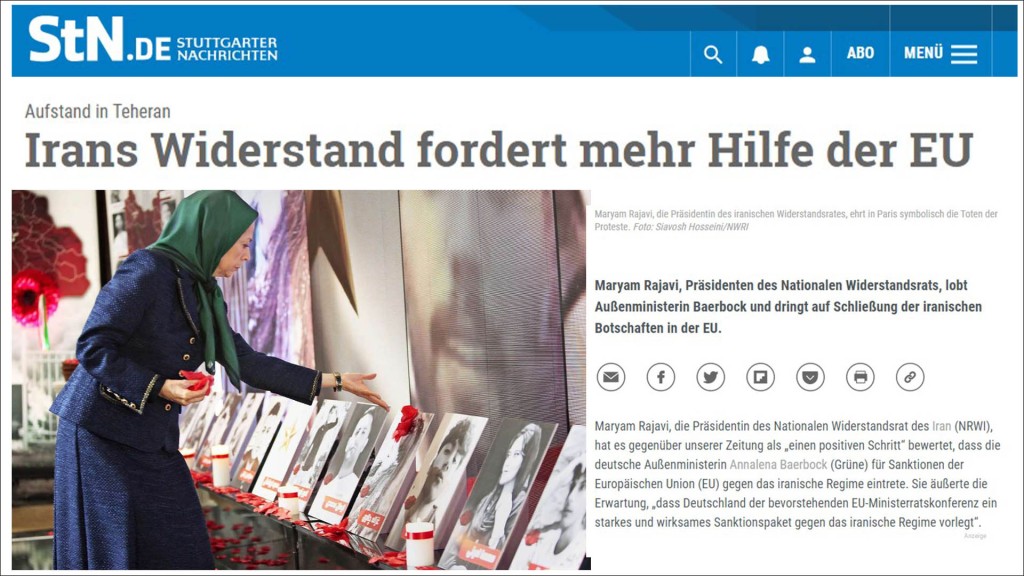Iran’s resistance calls for more EU help

Maryam Rajavi, president of the Iranian Resistance Council, symbolically pays tribute to those died during the protests in Paris. Photo: Siavosh Hosseini/NCRI
Maryam Rajavi, President of the National Council of Resistance, praises Foreign Minister Baerbock and urges the closure of Iranian embassies in the EU.
Maryam Rajavi, President of the National Council of Resistance of Iran (NCRI), told our newspaper that it was “a positive step” that German Foreign Minister Annalena Baerbock (Greens) was advocating European Union (EU) sanctions against the Iranian regime. She expressed the expectation “that Germany will propose a strong and effective sanctions package against the Iranian regime to the upcoming EU Council of Ministers conference.”
Rajavi: “Close embassies”
The NCRI president, who resides in Paris, outlined a list of necessary measures. These included “the closing of embassies or at least the expulsion of the Iranian regime’s ambassadors from EU member states,” the “recall of European ambassadors from Iran,” and the decision to “make economic relations with the regime conditional on the end of repression and the release of all demonstrators and political prisoners.” Another NCRI demand is “the inclusion of the Iranian Revolutionary Guard Corps and the Ministry of Intelligence, who are directly involved in the carnage, in the EU terrorist list,” Rajavi told our newspaper.
Union faction also in favour of tougher sanctions
The demand for the inclusion of the Revolutionary Guards in the EU terror list is also echoed in German politics. In the German Bundestag on Wednesday, a motion of the CDU/CSU parliamentary group was discussed in its first reading, which demands an extension of the EU sanctions to “all persons and organs of the Iranian regime that are involved in the suppression of the current protests.” It also calls for “the EU-wide listing of the so-called Revolutionary Guards.” Their members should be “banned from entering the country and their assets frozen,” the motion says. The motion calls on the German government to expand “measures and means” to support the Iranian protest movement in Iran. For example, the motion mentions “access to encrypted telephony, internet, and satellite communication.” The Persian-language services of Deutsche Welle should also be expanded, the MPs demand.
“Uprising can lead to freedom”
At the German headquarters of the NCRI, they see chances “that the current uprising can actually lead to freedom if the international community stands by the Iranian people,” the German NCRI spokesperson Javad Dabiran told our newspaper. He points out that the protests – as of Wednesday – have already lasted 27 days and have gained renewed momentum since the weekend. There is unrest and resistance in 177 cities in the country and all 31 provinces. According to Dabiran, at least 406 people have been killed in the protests, and 20 000 have disappeared in prisons. According to Dabiran, the resistance is driven by “the great discontent in broad sections of the population with the regime.” The devastating effects of the coronavirus pandemic in Iran and the government’s reluctance to use vaccines had “made the anger among the people explosive,” Dabiran told our newspaper.
Protest is well-organized
There have been uprisings in Iran time and again in recent years. But the current protests are different, Dabiran believes. “They are much better organized,” says the NCRI spokesperson. In many cities, he says, resistance units have formed, acting in groups of up to 20 people. “They can thus protect each other when the security forces indiscriminately try to arrest individuals.” He said it was also a sign of the resistance‘s good organization that there were unified protest slogans across the country. “Death to the oppressors, whether Shah or religious leader,” has become a national cry. Dabiran attests that the German government is “louder than some other EU countries in supporting the protests.”
Nevertheless, he is not entirely satisfied with Berlin’s course on Iran. “Above all, the German government should stop being advised by lobbyists of the Iranian regime.” There is a network of lobbyists controlled by the Iranian embassy who should no longer be listened to, says Dabiran.

